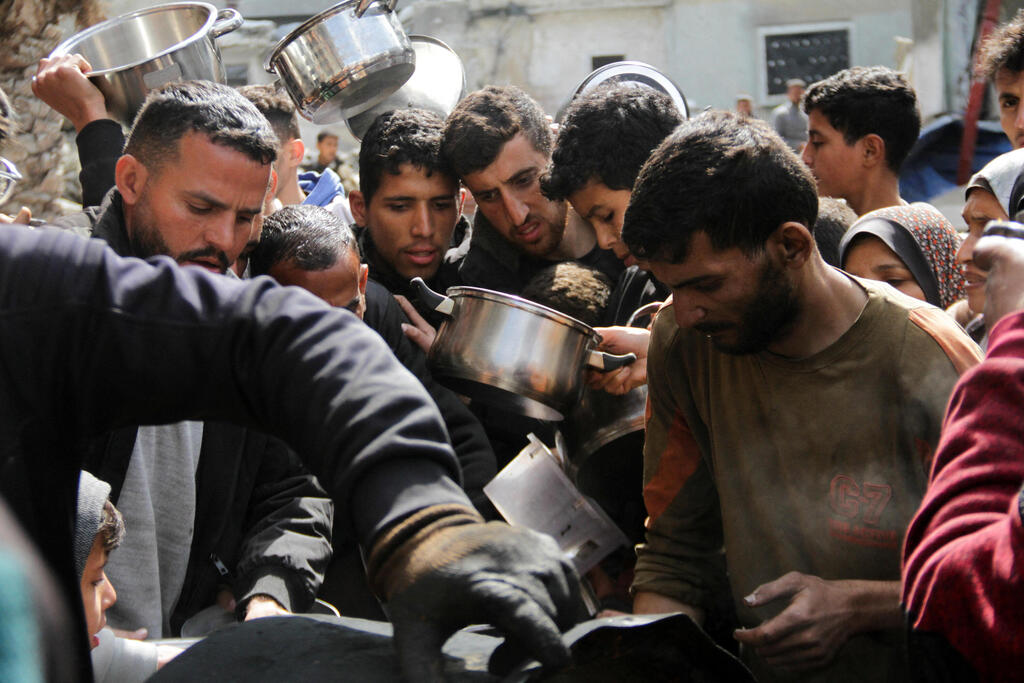The Israeli government and defense establishment currently see no viable alternative to Hamas' civilian governance in Gaza. There is no international or regional entity willing to manage daily life in the territory at this stage, and the Palestinian Authority isn't considered a realistic option, as it currently seeks Hamas' cooperation in governance under the Palestinian Liberation Organization (PLO) framework.
According to Shin Bet and IDF sources, the Palestinian Security Services are unable to enforce law and order in Gaza, especially with Hamas still present, as evidenced by their struggles in places like the Jenin and Nur al-Shams refugee camps in the West Bank.
Displaced Palestinians moving southward from Gaza City
Therefore, Israel faces three options. First, allowing Hamas to continue local and municipal management of Gaza, risking the slow rebuilding of its military capabilities.
Second, is allowing the current chaos, which UN reports indicate is pushing Gaza's population toward famine and epidemics, potentially leading to a humanitarian disaster. This chaos not only causes human suffering but also diminishes Israel's international legitimacy to continue operations in Gaza, as evidenced by the Canadian Parliament's recent decision to halt weapon shipments to Israel, hinting at broader consequences if the chaos persists.
The third option is temporary Israeli martial law in Gaza to ensure the delivery of essentials like food, health care, water, electricity and law enforcement. Under this, the IDF would secure humanitarian aid via sea and land crossings, establishing checkpoints and distribution centers in controlled areas for orderly aid distribution by international agencies.
Following the cessation of hostilities in Rafah and an agreement between Israel and Egypt to block smuggling along the Philadelphi Corridor on the Egyptian border, civilian governance could transition to a body rebuilt under international consensus, initiated by the U.S. and with Israel's agreement, potentially to a "revitalized Palestinian Authority" or an international civilian task force under UN auspices.
Read more:
The underlying conclusion is that without the immediate establishment of Israeli martial law in Gaza to secure and distribute humanitarian aid in the coming weeks, dismantling Hamas' current or reconstructed civilian governance under IDF oversight, a definitive victory cannot be achieved.
The IDF is systematically dismantling Hamas and Palestinian Islamic Jihad's military capabilities in Gaza, with operations to extend into Rafah and the central camps, ensuring Hamas cannot rebuild militarily.
However, the same process for civilian infrastructure is just beginning. Without an alternative civilian government to meet the population's immediate needs, Hamas will likely regain control and reemerge as a "resistance" organization against Israel.
In the current situation, only Israeli martial law can prevent this, recognizing that reliance on local militias or regional committees would likely result in even greater chaos, similar to conditions in Somalia or Afghanistan.
1 View gallery


Palestinians standing in line to receive food rations in Jabaliya, northern Gaza Strip
(Photo: REUTERS/Mahmoud Issa)
Historical experience demonstrates that since the time of Alexander the Great in the 4th century BCE, any army that conquered a geographical area and its population established its own civil-military governance. Only after stability had been achieved did control was transferred to local allies who had supported the conqueror from the start.
This approach was successfully employed by the Allies in West Germany and Japan after World War II, including re-educating the population toward democratic values.
In contrast, the U.S. reliance on local governments from the onset in Afghanistan and Iraq this century led to disastrous outcomes, with Afghanistan falling to the Taliban and Iraq struggling under a Shia regime post-Saddam Hussein.
Surprisingly, the Biden administration proposes a similar strategy for Israel with the Palestinian Authority, disregarding the potential for similar collapse.
Israeli martial law in Gaza should be temporary, avoiding permanent civilian control or resettlements, to prevent future disaster while maintaining the legitimacy to dismantle Hamas' military and civilian rule.




